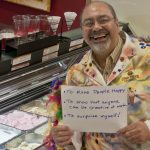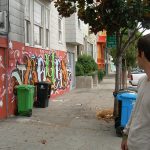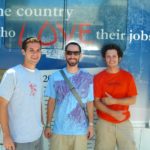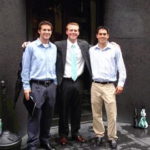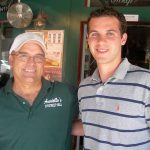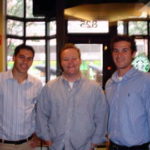Dave Martinez is a risk-taker. He uses the notion of failure as motivation. He attended Cal State Northridge on scholarship while also working for UPS full-time. At the time, he was really into the rave scene and saw areas of opportunity in what these sound companies lacked. Boomboy and Shredder were the only two competing sound companies in the L.A. area. These two companies had a shared stranglehold on the rave market. Dave decided that he wanted in.
 So, he sold his dirt bike and bought four Cerwin Vega speaker cabinets (two 15” sub-woofers and a tweeter per four range cabinet) on a whim. He figured that even if his business plans failed that he could still use his connections as a DJ to rent the equipment out to others. His first steady gig came spinning every Wednesday at the World Club in Los Angeles. After gaining four years of hands-on experience, Dave felt comfortable enough to quit his job at UPS to do sound setup full-time. He would be taking a risk, but he would also be getting paid $300 a setup with the potential of multiple setups a week.
So, he sold his dirt bike and bought four Cerwin Vega speaker cabinets (two 15” sub-woofers and a tweeter per four range cabinet) on a whim. He figured that even if his business plans failed that he could still use his connections as a DJ to rent the equipment out to others. His first steady gig came spinning every Wednesday at the World Club in Los Angeles. After gaining four years of hands-on experience, Dave felt comfortable enough to quit his job at UPS to do sound setup full-time. He would be taking a risk, but he would also be getting paid $300 a setup with the potential of multiple setups a week.
His first clients were mainly club-goers looking for a sound system for weekend parties. Dave knew that his knowledge of sound was limited and proved himself to be right when he burned his cabinets during an early show. You could imagine his surprise as he watched his investments go up in flames. Dave wasn’t the only one surprised. The technicians at the Cerwin Vega factory asked him to bring the charred cabinets to their facility so that they could figure out how such a thing happened. Many hours and hypothetical scenarios later, the culprit was found; but not by any of the technicians. Yes, it seems that Dave knew more about sound then he had initially thought. He not only discovered the root of the problem, but the solution as well. He proposed that Cerwin Vega’s speakers should have two-way crossovers installed to avoid further fire hazards. This was an innovative idea, not only for Cerwin Vega, but for the entire sound industry. Needless to say, the technicians were impressed. One of them even offered to be his mentor. Dave’s mentor taught him the ins and outs of sound production and installation and before long Dave became a product tester for Cerwin Vega. The company supplied him with 100 test cabinets of his new invention. He began using them at competitions to show rival DJ’s that their equipment needed updating.
But with the crack down on raves by Los Angeles police, the market for sound systems soon fizzled and Dave found himself without work. Desperate for income and no longer able to utilize his corporate connections at Cerwin Vega, Dave decided that he would start his own clothing store. Once again recognizing Dave recognized that the city of Redlands had stores which catered to the tastes and lifestyles of skaters and surfers, but had nothing in the way of a hip-hop clothing store. As a result, Dave’s store, Headstone, began carrying up-and-coming brands such as LRG and Upper Playground. Dave likes the idea that he has creative control over which brands are available at his store.
Although he still operates the store, Dave found that the fashion industry did not have a whole lot of loyalty. LRG, a company which Dave helped make big, was now giving him problems. This turmoil eventually put an end to their relationship and Dave’s involvement in the fashion industry. Looking for a sense of loyalty in business, Dave decided to try his luck with the record business.
He has since signed DJ Stacy Kidd, and artists Awol One and Jynxx, and plans on continuing to search for new talent. Please visit his website at headstonerecords.com.
When speaking of the music and clothing industries, here is what he had to say:
“You either do it or you don’t survive. Clothing and music now is a playoff or a rip off another piece that have been done. People are watching 80’s movies and seeing what they’re wearing. 75% of the best music has already been done. There is a lot of music that samples from old music today, including Kayne West.”

